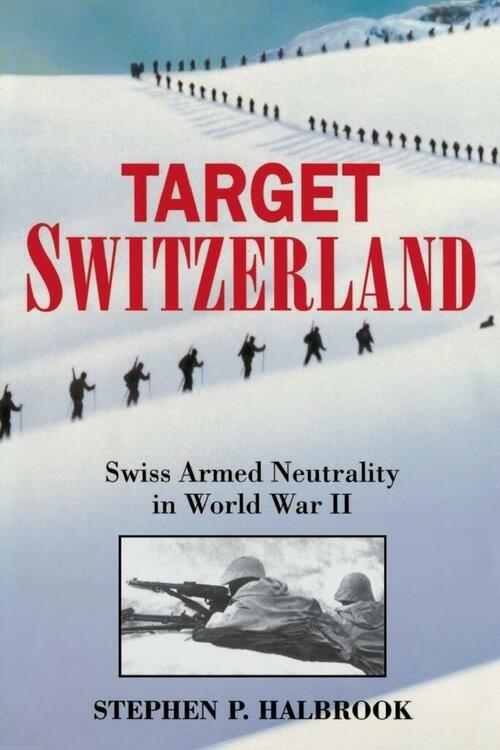
The Nation Hitler Feared To Invade
Authored by Felix Abt via VoiceFromRussia.ch,
Why Hitler Never Invaded Switzerland: The Power of Armed Neutrality
Switzerland’s survival during World War II was no accident—it was the result of a deliberate and calculated strategy of armed neutrality. While Hitler conquered most of Europe, Switzerland remained independent, unoccupied, and defiantly neutral, despite being surrounded by hostile Axis forces.
Nazi Germany had an invasion plan (Operation Tannenbaum), and Hitler despised Switzerland’s democracy. Yet, the invasion never came. Why? Because Switzerland masterfully balanced defiance with pragmatism, ensuring that the cost of occupation far outweighed any potential gains for the Third Reich.
This was not passive neutrality—it was active, armed, and uncompromising.

1. Neutrality as a Shield—Backed by Strength
Switzerland’s neutrality was not merely a diplomatic posture—it was a military doctrine. Unlike other neutral nations such as Belgium or the Netherlands, Switzerland did not rely on promises or treaties for protection. Instead, it deterred aggression through:
- A fully mobilized citizen army (850,000 troops at its peak—nearly 20% of the population).
- The National Reduit strategy, which turned the Swiss Alps into an impregnable fortress.
- A policy of total resistance—General Guisan declared in 1940 that Switzerland would fight to the last bullet rather than surrender.
Hitler understood that invading Switzerland would result in:
A prolonged guerrilla war in the mountains.
Diverting half a million troops from the Eastern Front.
Losing critical banking and trade links.
Neutrality only worked because Switzerland was prepared to defend it at all costs.
2. Economic Concessions—But Never Submission
Switzerland struck pragmatic deals with Nazi Germany, but it never became a puppet state.
- Swiss banks processed Nazi gold (including looted assets), yet the country refused full integration into Hitler’s financial system.
- Swiss factories sold machinery to Germany, but never ceded direct Nazi control over production.
- Germany used Swiss tunnels for supply routes, but Switzerland strictly regulated shipments, rejecting unrestricted access.
These concessions kept Nazi Germany dependent on Swiss cooperation—making invasion economically counterproductive.
3. Diplomatic Tightrope—Mastering Strategic Maneuvering
Switzerland’s neutrality was not blind idealism—it was cold, calculated realpolitik:
-
Espionage hub – Both the Allies and Axis used Switzerland for intelligence operations, yet Switzerland never openly sided with either.
-
Humanitarian leverage – The Red Cross, based in Geneva, provided aid to POWs (including Germans), granting Switzerland moral influence.
-
Refugee policies—a dark compromise – While Switzerland rejected many Jewish refugees, it sheltered thousands, carefully navigating Nazi pressure and international scrutiny.
Switzerland survived by never leaning too far toward either side, maintaining just enough independence to stay intact.
4. The Lesson: Neutrality Must Be Defended
Switzerland’s WWII survival proves that neutrality is meaningless without the strength to uphold it. Hitler did not spare Switzerland out of respect—he avoided invasion because:
The military cost was too high.
The economic benefits were too valuable to lose.
Swiss resistance made occupation impractical.
Other neutral nations like Belgium, Denmark, and Norway were overrun because they lacked Switzerland’s unique combination of geography, military readiness, and ruthless pragmatism.
Fazit: Warum die Neutralität der Schweiz funktionierte
Switzerland’s survival was a masterclass in realpolitik:
1. It armed itself to the teeth—neutrality without strength is surrender.
2. It made deals but never surrendered sovereignty—economic cooperation ≠ occupation.
3. It played both sides without committing—diplomatic agility kept it alive.
Switzerland’s independence was not a gift from Hitler—it was secured through steel, strategy, and sheer stubbornness.
Neutrality is not passive. It is a battle—and Switzerland fought to win.
A Warning from History: Switzerland’s Neutrality Under Threat
Switzerland’s WWII strategy remains deeply relevant today. In an era of shifting global power struggles, small nations do not survive by hoping for mercy—they endure by ensuring that aggression remains too costly to pursue.
It is concerning that some Swiss elites appear to have forgotten the lessons of history—the very principles that enabled Switzerland, a nation shaped by adversity, to prosper despite its scarcity of natural resources, insufficient arable land to feed its inhabitants, and lack of access to the sea.
Take the Neue Zürcher Zeitung (NZZ), Switzerland’s most influential newspaper. During WWII, its editor-in-chief, Willy Bretscher, was a staunch defender of neutrality, resisting both Nazi fascism and Soviet communism. Under his leadership, the NZZ balanced criticism with pragmatism, recognizing that Switzerland’s survival depended on rejecting ideological alignment.
Today, however, Eric Guyer, the NZZ’s editor-in-chief, has taken a sharply different stance. A fervent transatlanticist ideologue, he consistently targets Russia and China while openly dismissing neutrality—calling it a “burden” and leaning toward NATO integration. This shift is dangerous.
The Swiss people must push back!
Neutrality is not a relic—it is the foundation of Switzerland’s survival. If the country abandons its strategic independence, it risks becoming a pawn in great-power conflicts, much like smaller nations that fell to Hitler’s ambitions.
History’s warning is clear: A Switzerland that forgets its neutrality is a Switzerland that gambles with its survival.
Tyler Durden
Fri, 05/30/2025 – 03:30









!["Dzieci się do mnie nie przyznają. Ale pieniądze biorą" [LIST]](https://cdn.kobieta.onet.pl/1/1zMk9lBaHR0cHM6Ly9vY2RuLmV1L3B1bHNjbXMvTURBXy8yMjkzZDc3OGI4YTE5ZmRmZDZkNDViMzU0Mjk2OTBkMi5qcGeSlQMAzLvNApvNAXeTBc0EsM0DIN4AAqEwB6ExBA)
![Dzień Dziecka w Lutowiskach! To był wyjątkowy dzień pełen uśmiechu [ZDJĘCIA]](https://storage.googleapis.com/bieszczady/wbieszczady/articles/image/f37162f1-9fb4-498e-bcad-b091e25d52fc)


![Kolejny wypadek w pobliżu Castoramy w Toruniu [ZDJĘCIA]](https://tylkotorun.pl/wp-content/uploads/2025/05/1212.jpg)

